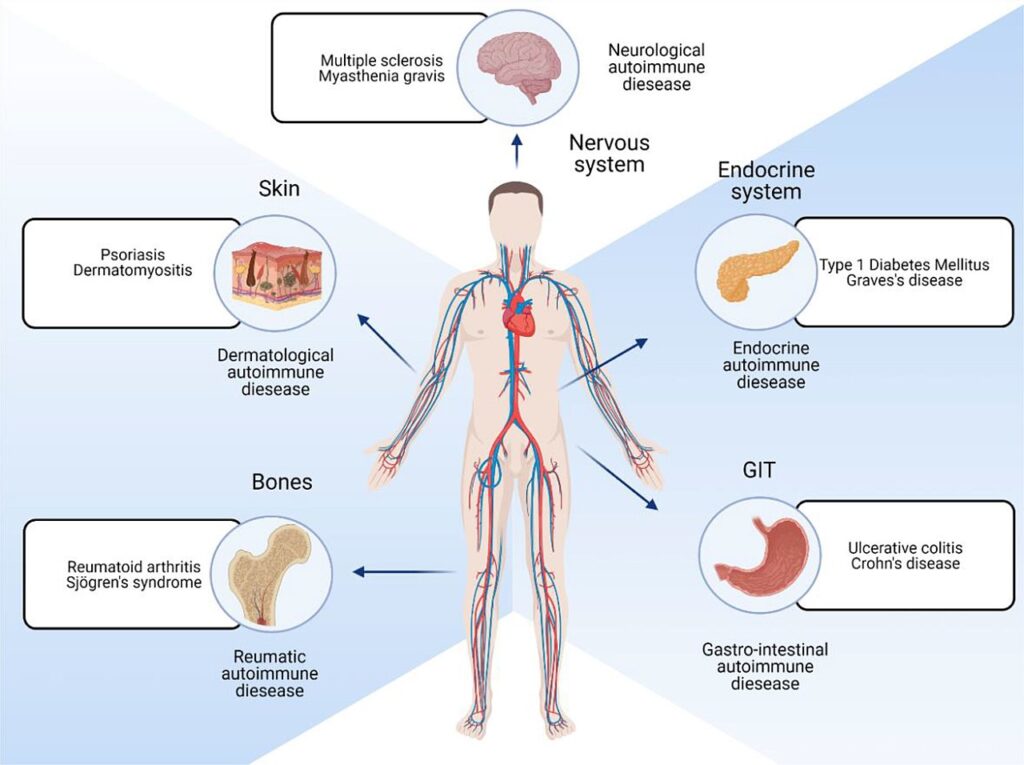Table of Contents
Understanding Autoimmune disease diagnosis
Autoimmune disease diagnosis can be a challenging process, as symptoms can be varied, nonspecific, and often mimic other conditions. Diagnosis typically involves a combination of the patient’s medical history, physical examination, and various laboratory tests. This article will delve into the essence of autoimmune disease diagnosis.

- Medical History: A healthcare professional will begin by taking a detailed medical history, asking about the patient’s symptoms, family history of autoimmune diseases, and any potential environmental factors that could contribute to the development of the condition.
- Physical Examination: A thorough physical examination can help identify signs of inflammation, organ involvement, and other indications of an autoimmune disease. This examination may involve checking for rashes, joint swelling, or listening to the heart and lungs, among other assessments.
- Laboratory Tests: A variety of laboratory tests can help confirm or rule out an autoimmune disease. These tests may include:
- Blood Tests: Blood tests are the most common, as they can reveal the presence of specific proteins, enzymes, or autoantibodies, which are proteins produced by the immune system that mistakenly target the body’s own cells. Examples of such tests include antinuclear antibody (ANA) test, rheumatoid factor (RF) test, anti-citrullinated protein antibodies (ACPA) test, anti-cyclic citrullinated peptide (anti-CCP) test and many others. It is important to note that the presence of autoantibodies alone does not confirm an autoimmune disease, as they can also be present in healthy individuals. Therefore, these tests are usually combined with other diagnostic tools to reach a conclusive diagnosis.
- Imaging Studies: Imaging tests can also be invaluable in the diagnostic process. For example, Magnetic Resonance Imaging (MRI) scans can identify lesions in the brain or spinal cord suggestive of Multiple Sclerosis. For Rheumatoid Arthritis, X-rays can reveal joint damage. However, these tests are typically used to confirm a diagnosis rather than as initial screening tools.
- Biopsies: In certain situations, a biopsy may be necessary to confirm a diagnosis. This procedure involves taking a small sample of tissue for examination. In Crohn’s disease, for instance, a biopsy of the intestine can reveal damage indicative of the disease.
- Other Specialized Tests: Depending on the specific symptoms and suspected autoimmune disease, other specialized tests may be ordered such as a nerve conduction study for multiple sclerosis or an electromyogram (EMG) for myasthenia gravis, or colonoscopy examination for inflammatory bowel disease (IBD).
- Specialist Consultation: Depending on the specific autoimmune disease suspected, a referral to a specialist may be necessary. Rheumatologists, neurologists, gastroenterologists, and endocrinologists are among the specialists who can provide expert opinions on the autoimmune disease diagnosis and management.
The process of autoimmune disease diagnosis is often iterative and requires repeated assessments over time. Some patients may receive a diagnosis of Undifferentiated Connective Tissue Disease (UCTD) initially, which means they have symptoms and lab results indicative of an autoimmune disease, but not enough to diagnose a specific condition. Over time, as more symptoms manifest, a more definitive diagnosis can be made.
Despite the challenges, early and accurate diagnosis of autoimmune diseases is paramount. It enables timely initiation of treatment, potentially slowing disease progression and improving quality of life. However, it’s equally important to understand that the patient’s journey doesn’t end with diagnosis. Autoimmune diseases are chronic and often require long-term management strategies including medication, lifestyle modifications, and regular follow-ups.
The essence of autoimmune disease diagnosis involves understanding the complexity of symptoms, obtaining a comprehensive medical history, running specific lab tests, and often, consulting multiple specialists.
With ongoing research and advancements in medical technology, we hope to simplify this process and provide relief to millions of people affected by autoimmune diseases globally.
If you or a loved one are experiencing unexplained symptoms, it’s imperative to seek medical advice. Early detection and management of autoimmune diseases can significantly enhance the quality of life.
Remember, Your Health is Your Wealth!